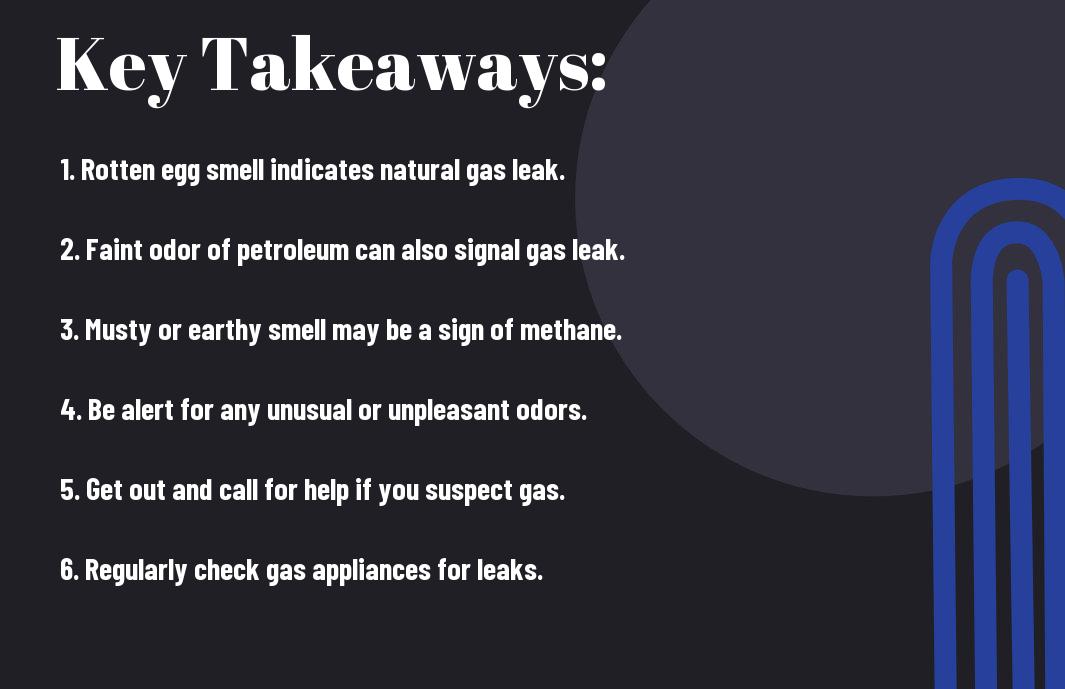Perceiving the scent of a gas leak is crucial for ensuring safety at home. Gas leaks can be extremely dangerous, leading to fires, explosions, and even health issues if not promptly addressed. In this informative blog post, I will discuss the unique odor of different types of gas and how to identify a potential gas leak in your home. It’s important to remember that natural gas, propane, and other gases used in homes do not have a natural smell, so an odorant is added to help with detection. I will also provide tips on what to do if you suspect a gas leak and emphasize the importance of acting swiftly to prevent potentially catastrophic consequences.
Key Takeaways:
- The smell of a gas leak is often described as rotten eggs or sulfur. Natural gas and propane are both odorless gases, but an additive called mercaptan is added to give them a distinct smell in case of leaks.
- Gas leaks can also produce a faint, sweet smell, or a chemical or metallic odor. It’s important to be aware that not all gas leaks will smell like sulfur, so pay attention to any unusual or out-of-place odors in your home or building.
- If you suspect a gas leak, it’s important to act quickly and get to a safe location. Open windows and doors to ventilate the area, do not use any electronic devices or turn on lights, and call your gas company or emergency services for assistance.
- Regularly inspect gas appliances for leaks or damage to prevent potential hazards. Keep an eye out for indicators like hissing sounds, bubbles in the gas line, or dead vegetation around a gas line, and schedule regular maintenance with a professional to ensure the safety of your gas systems.
- Gas leaks can be deadly, so it’s crucial to take any suspicious odors seriously and prioritize safety. Training yourself and your family members on what to do in case of a gas leak can help prevent accidents and ensure a swift and effective response in the event of an emergency.
Identifying Gas Odors
The sense of smell is crucial in detecting gas leaks, as most gases are odorless in their natural state. What does a natural gas leak smell like? This is a common question and the answer lies in the distinct odorants added to natural gas and propane for easy detection. Being able to identify these odors can help you act quickly and prevent potential hazards.
Natural Gas
Natural gas itself is odorless, but gas companies add a chemical called mercaptan to give it a pungent rotten egg or sulphur-like smell. This distinctive odor makes it easy to detect even in small amounts, helping you to quickly identify a potential leak in your home or workplace. It’s important to always take any unfamiliar smell seriously and investigate further to ensure safety for you and your family.
Propane
Propane, commonly used in household heating systems and gas grills, is also odorless in its natural state. To help with detection, manufacturers add a chemical called ethyl mercaptan, giving propane a strong, unpleasant odor similar to that of natural gas. This odor can serve as a warning sign if there is a potential leak, allowing you to take immediate action to prevent any dangers.

Signs of a Gas Leak
One of the most important steps in identifying a gas leak is being aware of the signs. Gas leaks can be extremely dangerous, so it’s crucial to know what to look for in order to prevent potential accidents and harm to you and your family. Here are the main signs to watch out for:
Physical Symptoms
If you suspect a gas leak, pay attention to any physical symptoms you or your family members may be experiencing. These can include dizziness, nausea, fatigue, headaches, and breathing difficulties. These symptoms can be indicative of exposure to natural gas and should not be taken lightly. If you notice these signs, it’s important to take immediate action to ensure your safety.
Flammable Gas Detectors
Installing a flammable gas detector in your home can be a life-saving measure. These devices are designed to detect the presence of gas in the air, sounding an alarm if levels become hazardous. Having a detector installed in your home can provide you with an early warning of a potential gas leak, allowing you to take action before the situation becomes dangerous. This is especially important if you have natural gas appliances or use propane for heating or cooking.
What to Do if You Suspect a Gas Leak
Your safety is the most important thing to consider if you suspect a gas leak. If you smell a strong odor of rotten eggs or sulfur, hear a hissing sound near a gas appliance, or notice dead vegetation or bubbles in standing water, it’s important to take action immediately. Here’s what you need to do:
Evacuation Procedures
If you suspect a gas leak, the first thing you should do is evacuate the area immediately. Open windows and doors to let the gas escape if it is safe to do so, but do not turn on any electrical switches, appliances, or lights, as they could cause a spark. Once you are a safe distance away, call 911 or your local gas company to report the leak. Do not return to the area until it has been deemed safe by a professional.
Emergency Contact Information
It’s important to have emergency contact information readily available in case of a gas leak. Take the time to program the phone number for your local gas company into your phone, and keep a list of emergency contacts in a visible location in your home. This could include the fire department, your building superintendent, and any other relevant emergency numbers. Time is of the essence when it comes to gas leaks, so having this information easily accessible could be crucial in an emergency situation.

What Does a Gas Leak Smell Like? Identifying Gas Odors
With these considerations in mind, it is crucial to be aware of the distinct odors associated with gas leaks. The smell of rotten eggs or sulfur is a clear indication that there may be a gas leak in your home or workplace. If you detect this odor, it is important to take immediate action to ensure your safety and the safety of those around you. Remember to never ignore the smell of gas, as it could indicate a potentially dangerous situation. By staying alert and knowing what to look out for, you can help prevent potential disasters and keep yourself and others safe from the dangers of gas leaks.
Gas Leak FAQ
Q: What does a gas leak smell like?
A: Natural gas is odorless, but gas companies add a chemical called mercaptan which gives it a distinctive “rotten egg” smell. Propane, on the other hand, has a strong, skunk-like odor.
Q: What should I do if I smell gas in my home?
A: If you smell gas in your home, leave the area immediately and call your gas company. Do not use any electrical devices, including light switches or cell phones, as they could ignite the gas. Once outside, do not re-enter the building until it has been deemed safe by a professional.
Q: Are there any signs of a gas leak if I can’t smell anything?
A: Yes, there are other signs of a gas leak aside from the odor. These include a hissing or blowing sound near a gas line, dead or dying vegetation near a gas line, or bubbles in standing water outside.
Q: How do I identify a gas odor in my home?
A: If you suspect a gas leak, you can identify the source of the odor by carefully sniffing near gas appliances and pipes. You may also use a gas detector to help pinpoint the location of the leak.
Q: What should I do if I suspect a gas leak outside of my home?
A: If you suspect a gas leak outside, such as in your yard or on the street, leave the area immediately and call your gas provider. Do not try to locate the source of the leak on your own and do not start any vehicles or power equipment in the area of the suspected leak.









Leave a comment